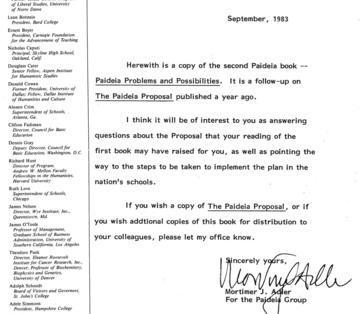Paideia Yesterday
Our History

The National Paideia Center was founded in 1988 at the University of North Carolina by philosopher Mortimer Adler and then University President William Friday. This program sprang from the publication of The Paideia Proposal in 1982, written by Adler and members of the original Paideia Group. This book promoted the Paideia Program, a new relationship between three types of teaching: didactic instruction, intellectual coaching, and seminar discussion, which would in turn lead to enhanced critical thinking skills for all students.
The stated goal in establishing the NPC was to create an entity through which the mission of the Paideia Program would be carried on in perpetuity. That mission was—and still is—to create a public school system that was at once intellectually rigorous and fundamentally equitable, beginning first in the United States and then spreading abroad. By 1993 the NPC had two small offices in the basement of the UNC School of Education and operated on a modest annual budget, with programming consisting of an occasional one- or two-day workshop and a small national meeting. In 1993, Terry Roberts was hired to revive the largely dormant Center (he continues to serve as director of the NPC today). Over the next ten years, the NPC experienced an expansion in both budget and programming and was able to increase dramatically its impact on public school practice.
Between 1993 and 1999, the NPC grew as a core staff consisting of former public school teachers developed the materials and professional development programs necessary to support systemic, whole-school implementation of the Paideia philosophy, including an annual Paideia Conference. Over the past few decades, the NPC has evolved through several different organizational structures as well as staffing models, culminating in its establishment as a non-profit school improvement organization in 2013, fully independent of the UNC system.
Now more than 30 years old, the NPC is still dedicated to its original mission of school-based educational reformation, with a current focus on the Paideia School of Creative Thinking as the most powerful environment for training minds for the challenges of 21st century life.
Conference Updates
-
Registration Now Open for the 2026 National Pai...
We are thrilled to announce that registration is now open for the 2026 National Paideia Conference! Join educators from across the country for two days of learning, dialogue, and inspiration...
Registration Now Open for the 2026 National Pai...
We are thrilled to announce that registration is now open for the 2026 National Paideia Conference! Join educators from across the country for two days of learning, dialogue, and inspiration...
-
Announcing the 2026 National Paideia Conference...
“Paideia is the single largest influence on my career. It permeates every facet of my teaching. It all began with a two-day Intro to Paideia Seminar.”— Austin Lassiter, HS History Teacher...
Announcing the 2026 National Paideia Conference...
“Paideia is the single largest influence on my career. It permeates every facet of my teaching. It all began with a two-day Intro to Paideia Seminar.”— Austin Lassiter, HS History Teacher...
Frequently Asked Questions (FAQ)
What is included in the registration fee?
The registration fee of $700 includes access to all conference sessions, keynote presentations, Paideia course materials, and networking events.
Where will the conference take place?
Join us at Charleston Charter School for Math and Science, 1002 King St, Charleston, SC 29403 —a beautiful setting for learning and collaboration.
How do I register a group from my school?
To register a group, you can use the group registration link on our website or email us at info@paideia.org for assistance. Group discounts may apply.
Can I pay by purchase order?
Yes, purchase orders are accepted. Please submit your purchase order during registration or contact our team at info@paideia.org for instructions.
Will sessions be recorded?
No, sessions will not be recorded.
What are the daily start and end times for the conference?
Thursday: Come early! Registration and coffee start at 8:30 AM, and the opening session kicks off at 9:00 AM. The official day wraps up at 3:30 PM, with an optional social gathering at 5:00 PM for those who want to stay and connect.
Friday: The day starts at 9:00 AM and will finish by 3:00 PM.
